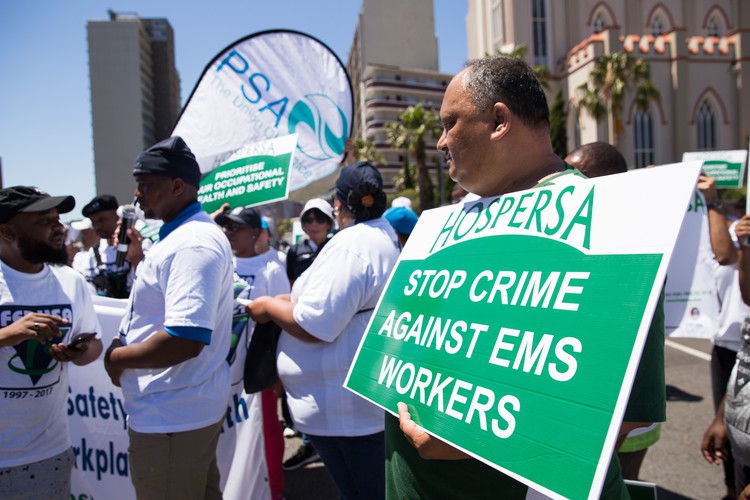
Union members marched to Parliament on Wednesday to demand better protection for emergency medical staff. Photo: Ashraf Hendricks
5 December 2017
Paramedics marched to Parliament on Tuesday to demand better protection against attacks, especially during the festive season.
According to Federation of Unions of South Africa (FEDUSA) general secretary Dennis George, there were more than 100 attacks on paramedics in the Western Cape in 2016. Paramedics had also been attacked in KwaZulu-Natal, Gauteng, Free State and Limpopo.
Members of FEDUSA and of the Health and Other Services Personnel Trade Union of South Africa (HOSPERSA) handed over a memorandum to Department of Labour provincial chief inspector David Esau after a march in which about 60 people took part.
The memorandum, addressed to the ministers of police, defence and labour, asked for better protection for emergency medical personnel, especially during the festive season.
In a statement, FEDUSA said the Department of Labour was responsible for occupational health and safety and Minister Mildred Oliphant should make sure proper health and safety measures were implemented.
President of FEDUSA, Godfrey Selematsela, told GroundUp the union wanted the deployment of “trained medical personnel from the army to accompany emergency medical services personnel when going into identified hotspots”.
“We’re making an appeal to national government” said Selematsela. “We had casualties in 2015, and had casualties in 2016” says Selematsela.
Paramedic Dometrican Beukes said attacks left paramedics vulnerable to post-traumatic stress disorder. “We are not good parents, and we’re not good colleagues,” said Beukes. He said paramedics tried to save people hurt in accidents. “But who is saving us” from crime while on duty, he asked.
“Calling for the army is not the solution- it is an emergency cry,” said Tahir Maepa, from FEDUSA.
George said the federation “demands urgent” protection for emergency medical services personnel in hotspot areas.
He called for a national occupational health and safety indaba, with the departments of labour and police and unions.
“We can’t afford to wait any longer,” said George.